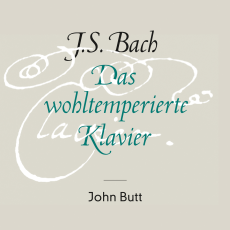John Butt - Bach WTC - MusicWeb International
John Butt has a distinguished reputation as an
organist and harpsichordist, and collectors of recordings from the Linn label
will associate his name with distinguished releases from the Dunedin Consort.
Extensive and informative booklet notes with this recording of theWell-Tempered Clavier reveal something of the history and
content of the work, as well as a substantial section on approach to
performance. There is a link to the Linn site with an extended version of these
notes which also includes references, and anyone studying Bach's seminal
masterpiece or just keen on enriching their knowledge and appreciation of its
workings will find much to engage with here.
Presented in a
package which seems to fold out forever, this is an edition with a luxury feel
and one of those items which continues to hold me back from diving fully into
the intangible realm of downloads. I'm a harpsichord fan and grew up on this
music played by Gustav Leonhardt on a recording now available from Deutsche
Harmonia Mundi. This Linn recording is superbly produced, and is a very fine
recording of the harpsichord used by the Dunedin Consort, a copy of one by a
builder called Michael Mietke from about 1702-4. The sound is very easy on the
ears and by no means fatiguing as can so easily be the case with harpsichord.
Starting out with
this recording I was presented with a quandary. I'm all for new approaches and
am by no means attached to any particular school when it comes to this music:
Leonhardt, Gould, Richter, Woodward or Hewitt, I'm prepared to admire the
qualities of a recording and also prepared to admit my own shortcomings if
there are aspects of a performance I may have misunderstood. Elements in John
Butt's wohltemperierte have Marmite qualities: you will
either love them or hate them, so my advice even before really getting my teeth
into the actual music is to take a listen from the Linn website. You can then
agree or disagree with anything I have to say.
...
I am in awe of Butt's keyboard prowess. The
final track on CD 1 is the Fugue No. 12 in F minor, the labyrinthine complexities of which are performed with
masterly skill and a fine sense of direction...Numbers with more
rapid tempi can be exciting and are performed with less complex interpretative
affect, and the Prelude No. 6 in D minor from Book II is a decent example, a
few moments of unexpected acceleration excepted - Butt has a tendency to rush
in odd places - the following fugue is also fine. This is perhaps the only way
I can sum up this Well Tempered Clavier, as being something which can be respected and admired, but
to my mind too often too minutely micro-managed in terms of drawing out and
exploring expressive points which Bach makes clearly enough with the notes as
written.
...
There are things to
admire in this recording of Das wohltemperierte Klavier. Once you've leapt over the hump which is the first Prelude in C major there are plenty of more
conventionally performed pieces and the production is exceptionally good, but
for me there are too many distracting questions this recording asks of the
listener. By no means are all of the preludes and fugues played with extreme
expressive emphases or oddly rushed passages, but this in itself is a serious
point. The question of expressive rhythmic distortion demands answers about
consistency: if one more or less lyrical movement is going to be played in this
way then why aren't others? Are we to consider this a new way of looking at how
the musician believes this is how Bach would have expected to hear his music -
or is this an extra layer of interpretation intended to raise the music's
expressive potential beyond that written by the composer?
I should get down
from the fence, and it would be all too easy to dismiss this set as a great
mound of notes which doesn't compete with the best of the rest. It's not my
place to make up the listeners' minds for them however. Have a listen and see
what you think: you may be pleasantly surprised.

